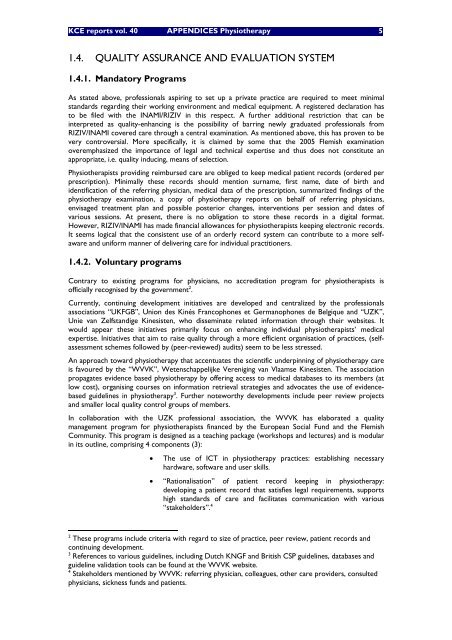Download the supplement (208 p.) - KCE
Download the supplement (208 p.) - KCE
Download the supplement (208 p.) - KCE
You also want an ePaper? Increase the reach of your titles
YUMPU automatically turns print PDFs into web optimized ePapers that Google loves.
<strong>KCE</strong> reports vol. 40 APPENDICES Physio<strong>the</strong>rapy 5<br />
1.4. QUALITY ASSURANCE AND EVALUATION SYSTEM<br />
1.4.1. Mandatory Programs<br />
As stated above, professionals aspiring to set up a private practice are required to meet minimal<br />
standards regarding <strong>the</strong>ir working environment and medical equipment. A registered declaration has<br />
to be filed with <strong>the</strong> INAMI/RIZIV in this respect. A fur<strong>the</strong>r additional restriction that can be<br />
interpreted as quality-enhancing is <strong>the</strong> possibility of barring newly graduated professionals from<br />
RIZIV/INAMI covered care through a central examination. As mentioned above, this has proven to be<br />
very controversial. More specifically, it is claimed by some that <strong>the</strong> 2005 Flemish examination<br />
overemphasized <strong>the</strong> importance of legal and technical expertise and thus does not constitute an<br />
appropriate, i.e. quality inducing, means of selection.<br />
Physio<strong>the</strong>rapists providing reimbursed care are obliged to keep medical patient records (ordered per<br />
prescription). Minimally <strong>the</strong>se records should mention surname, first name, date of birth and<br />
identification of <strong>the</strong> referring physician, medical data of <strong>the</strong> prescription, summarized findings of <strong>the</strong><br />
physio<strong>the</strong>rapy examination, a copy of physio<strong>the</strong>rapy reports on behalf of referring physicians,<br />
envisaged treatment plan and possible posterior changes, interventions per session and dates of<br />
various sessions. At present, <strong>the</strong>re is no obligation to store <strong>the</strong>se records in a digital format.<br />
However, RIZIV/INAMI has made financial allowances for physio<strong>the</strong>rapists keeping electronic records.<br />
It seems logical that <strong>the</strong> consistent use of an orderly record system can contribute to a more selfaware<br />
and uniform manner of delivering care for individual practitioners.<br />
1.4.2. Voluntary programs<br />
Contrary to existing programs for physicians, no accreditation program for physio<strong>the</strong>rapists is<br />
officially recognised by <strong>the</strong> government 2 .<br />
Currently, continuing development initiatives are developed and centralized by <strong>the</strong> professionals<br />
associations UKFGB , Union des Kinés Francophones et Germanophones de Belgique and UZK ,<br />
Unie van Zelfstandige Kinesisten, who disseminate related information through <strong>the</strong>ir websites. It<br />
would appear <strong>the</strong>se initiatives primarily focus on enhancing individual physio<strong>the</strong>rapists medical<br />
expertise. Initiatives that aim to raise quality through a more efficient organisation of practices, (selfassessment<br />
schemes followed by (peer-reviewed) audits) seem to be less stressed.<br />
An approach toward physio<strong>the</strong>rapy that accentuates <strong>the</strong> scientific underpinning of physio<strong>the</strong>rapy care<br />
is favoured by <strong>the</strong> WVVK , Wetenschappelijke Vereniging van Vlaamse Kinesisten. The association<br />
propagates evidence based physio<strong>the</strong>rapy by offering access to medical databases to its members (at<br />
low cost), organising courses on information retrieval strategies and advocates <strong>the</strong> use of evidencebased<br />
guidelines in physio<strong>the</strong>rapy 3 . Fur<strong>the</strong>r noteworthy developments include peer review projects<br />
and smaller local quality control groups of members.<br />
In collaboration with <strong>the</strong> UZK professional association, <strong>the</strong> WVVK has elaborated a quality<br />
management program for physio<strong>the</strong>rapists financed by <strong>the</strong> European Social Fund and <strong>the</strong> Flemish<br />
Community. This program is designed as a teaching package (workshops and lectures) and is modular<br />
in its outline, comprising 4 components (3):<br />
The use of ICT in physio<strong>the</strong>rapy practices: establishing necessary<br />
hardware, software and user skills.<br />
Rationalisation of patient record keeping in physio<strong>the</strong>rapy:<br />
developing a patient record that satisfies legal requirements, supports<br />
high standards of care and facilitates communication with various<br />
stakeholders . 4<br />
2<br />
These programs include criteria with regard to size of practice, peer review, patient records and<br />
continuing development.<br />
3<br />
References to various guidelines, including Dutch KNGF and British CSP guidelines, databases and<br />
guideline validation tools can be found at <strong>the</strong> WVVK website.<br />
4<br />
Stakeholders mentioned by WVVK: referring physician, colleagues, o<strong>the</strong>r care providers, consulted<br />
physicians, sickness funds and patients.
















